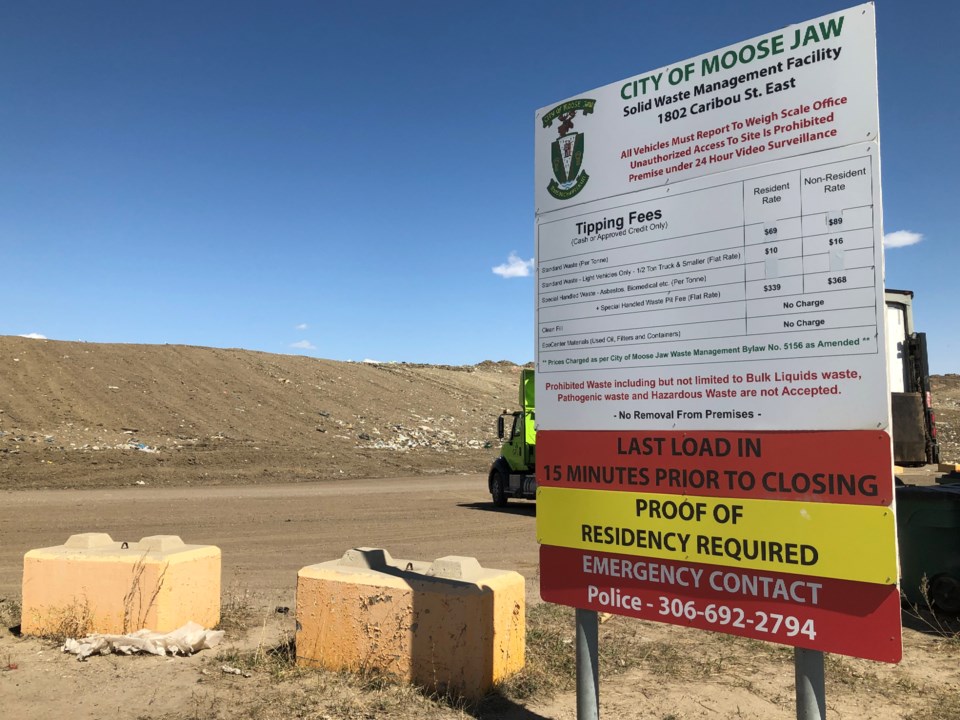MOOSE JAW — The changes that city hall is making to how it operates the landfill over the next five years are “long overdue” and “will be significant,” city administration says.
With Moose Jaw’s dump nearing the end of its operational life, city hall is adjusting how it operates the venue by changing the hours, increasing tipping fees and eliminating the public’s ability to access the landfill’s active side to deposit their garbage.
These changes are the most the landfill has ever seen, “arguably since the times when … you could go to the landfill and collect things and it was just a complete rodeo … ,” Bevan Harlton, director of operations, said during the Jan. 23 budget meeting while discussing the venue.
“I do want to note, again, that the landfill is full and the intent with this report and in 2025 is to focus on what we can do … to increase diversion and try and run this facility better,” he continued, adding that the operations department would monitor the landfill’s capacity twice a year and present further reports to council.
As part of the changes, the operations department — via its public works and utilities branch — plans to spend $525,000 to purchase a roll-off bin truck, four roll-off bins and a crew truck, which will support activities at the current landfill and the future solid waste management venue. It also plans to hire more staff.
Harlton explained that the roll-off bins are necessary because public works is closing the landfill’s active face to users. Instead, residential users will deposit their materials in the bins and crews will take the containers to the face and spread the garbage themselves. This allows staff to control where garbage is placed and helps them with compaction efforts.
However, commercial entities or entities with high volumes of garbage can continue depositing the refuse themselves, with landfill staff having the power to veto those activities if necessary, the operations director said.
Harlton added that an employee would oversee the four bins to ensure no one deposits material like bricks in them, while that person would give the municipality a better understanding of where it’s short with its services.
“Initially, it’s going to be chaos for the contractors … so we’re certainly going to have to be proactive on the communication piece on that and warn them ahead of time,” said Coun. Jamey Logan. “Or, they’re going to be paying out-of-town rates and won’t be thrilled with that.”
Some users may be upset that they can’t deposit the garbage themselves, so city hall could consider — as other municipalities have done — establishing a transfer station beside the dump, where landfill operators could scoop the debris into bins, he continued.
Also, it might help to create a spot where less physically capable people can drop their trash instead of throwing it into bins and a spot where people can pull up to the bins instead of backing in, Logan added.
Staci Dobrescu, manager of public works and utilities (PWU), addressed the issue of how landfill staff determine where people are from, saying people who don’t have a Moose Jaw-based postal code are considered out-of-towners. However, some people only have PO box numbers, so the PWU branch must determine whether they qualify as residents.
Harlton clarified that contractors must show their business licences or a demolition permit when depositing their garbage to claim the in-town rates since it’s the location from where the refuse comes that matters.
Meanwhile, Loraas, which handles Moose Jaw’s recycling, is not yet accepting No. 1 plastics, although the provincial regulator is looking at allowing that next year, said Dobrescue. City hall is working with the regulator to sign an agreement that would allow residents to deposit more plastics into their bins. This transition may take six to eight months.




